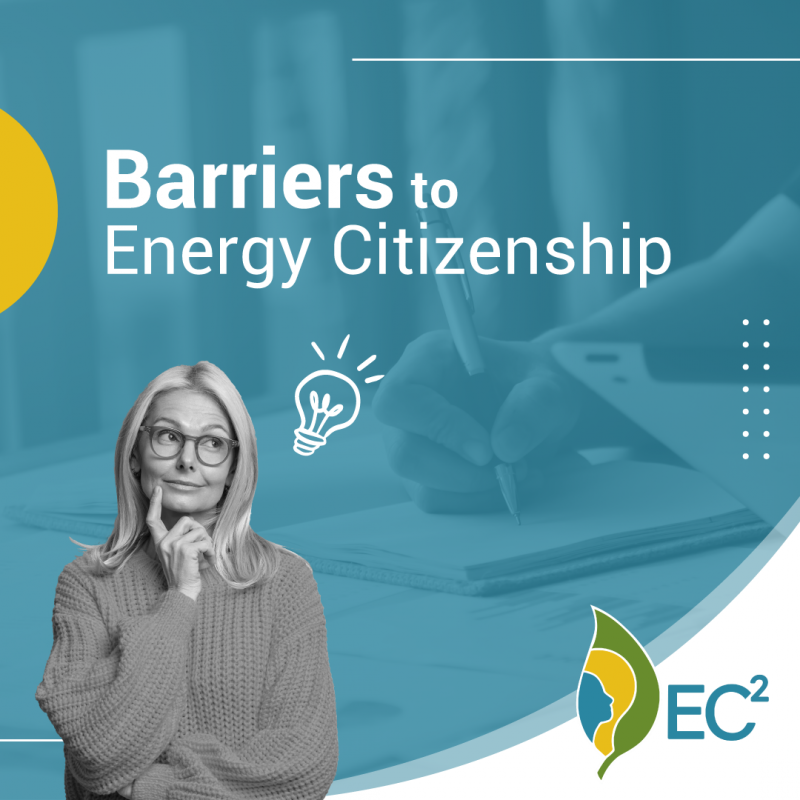Five ways citizens are finding it hard to join energy communities – and what can be done about it.
20 February 2023
Markus Mogg, Uni Graz, with the research teams from Uni Graz and WUEB

What enabled a group of citizens in northern Italy to set up their own renewable energy cooperative? How did a residents association in Poland come together to tackle energy issues? And with so many examples of citizen action for clean energy, what’s holding many other groups back?
There can be complex legal, economic and even psychological factors that stand in the way of citizen engagement on energy issues. The EC2 project is asking what makes it easier for people to become “energy citizens”, exercising their rights and responsibilities for a just and sustainable energy transition together with their communities. It’s also taking a deeper look at renewable energy communities, the conditions that help them thrive, and what might be blocking their set-up.
EC2 researchers analysed the legal and economic situation in countries across Europe, as well as asking citizens about their experiences in co-creation workshops. The result is a newly-published catalogue of barriers and facilitators to energy citizenship that furthers our understanding of the relationship between energy citizenship, energy communities, and the legal and economic conditions surrounding them. For this two-part article, we asked the researchers to highlight some of their key findings – here’s what they told us.
Some key barriers to energy citizenship
1. Too little information
“The establishment and operation of an energy community is very complex and requires a whole range of information, such as which permits you need, how the generation plant will be installed, and a range of legal issues,” says Celin Gutschi from the University of Graz. “Information often has to be obtained laboriously from many different sources and is not easily understandable for non-experts. Too little information is a problem, but on the other hand, an overabundance of information can also lead to consumers feeling overwhelmed.”
2. Property ownership
According to Piotr Szymański from the Wroclaw University of Economics, many EU citizens simply don’t have opportunity to participate in energy transition. One of the main reasons for their exclusion is the lack of their own property where solar panels can be installed (according to Eurostat, approximately 30% of EU citizens don’t own their property). Even where they do, poor roof conditions (too small, no load capability, unfavourable orientation) can put a stop to a citizen’s clean energy ambitions. For these reasons, 60% of residential buildings in Poland don’t have the technical capacity for a solar setup - and the situation is similar in many other EU countries.
3. Housing law
If it’s difficult to set up solar on your own home, it’s even more so when dealing with condominiums or housing associations, says Brigitta Lurger from the University of Graz. “Tenants and condominium owners are confronted with several problems when they think about installing a photovoltaic plant on their residential property. For example, in most jurisdictions, tenants need the consent of the landlord to install a photovoltaic plant. Condominium owners often need the consent of the other condominium owners, with some jurisdictions even requiring unanimous consent of all other condominium owners. This complicates or even prevents the installation of a photovoltaic plant and thus also the transition to renewable energy production.”
4. Different rules on energy self-consumption and energy communities
“Often, different rules apply to energy self-consumption and energy communities. This makes the system less flexible, if, for example, someone starts out as an energy self-consumer and then wants to share energy with others and set up an energy community for that purpose,”, says Maria Bertel, professor of public law at the University of Graz.
5. Lack of legal guidance
When deciding to set up an energy community, its founders are required to choose a legal form which equips the energy community with its own legal personality. However, neither the EU Directives nor the national legislators determine the appropriate legal form. “The choice can easily overburden potential founders who are unfamiliar with the law, or unaware of the specific characteristics of the respective legal forms and the costs associated with them,” explains Celin Gutschi. Before setting up an energy community, citizens need to be informed about the high formation and operating costs, complex formal requirements (such as a notarial deed) and liability issues. “Most people will have to seek expensive legal advice,” says Celin, “and the effort and costs can discourage people from setting up an energy community.
The good news is that the researchers found several examples of good practice that can be implemented to ease the burden on citizens who want to get involved in energy issues – though their implementation will require strong institutional backing. Read part II of this article where we explore what can be done.
The catalogue produced by EC2 will be used for further research, to support the creation of tools to overcome barriers to energy citizenship, and to create recommendations for policymakers working on the green energy transition. Read the full deliverable here and stay up to date on the research by signing up to our newsletter here.
Download the research







